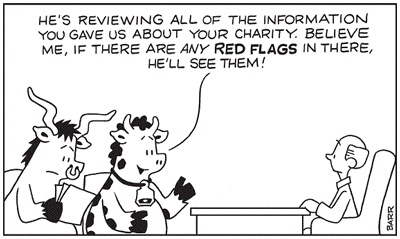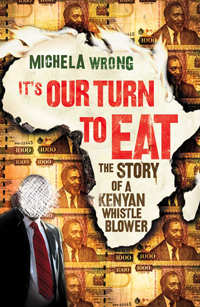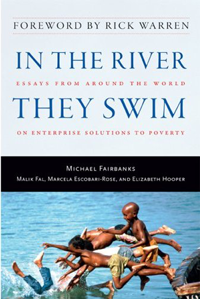Friday Round Up
Monkeys Do Markets
 In a recent experiment, a team of scientists trained a vervet monkey to open a container of apples, a task no other monkey in her group could do. She was well-compensated for this service by the other monkeys, who began to spend a lot of time grooming her (apparently, grooming is the monkey unit of exchange). Then, the scientists trained another monkey in the group to get the apples, and the “price” for the service (ie the amount of grooming the apple-providing monkeys received) went down. NPR Correspondent Alex Bloomberg explained:
In a recent experiment, a team of scientists trained a vervet monkey to open a container of apples, a task no other monkey in her group could do. She was well-compensated for this service by the other monkeys, who began to spend a lot of time grooming her (apparently, grooming is the monkey unit of exchange). Then, the scientists trained another monkey in the group to get the apples, and the “price” for the service (ie the amount of grooming the apple-providing monkeys received) went down. NPR Correspondent Alex Bloomberg explained:
[W]hen there was a monkey monopoly on the skill, the monkeys paid one price. But when it became a duopoly, the price fell to an equilibrium point, about half of what it had been. And this all happened despite the fact that we're talking about monkeys here. Monkeys can't do math.
What’s the point, other than research studies are really bizarre? Acquiring a sought-after new job skill leads to a higher income, even among monkeys. And, monkey markets can still set prices, even though the market participants can’t add, sign contracts, or talk. And, perhaps, complex markets can be the product of an unintentional, spontaneous order: Out of the chaos of many monkeys running around hitting one another on the heads, pulling nits off each other’s fur, following only the simple rules of monkey hierarchies and monkey appetites…a functioning market emerges.
The Most Remote Place in the World is Three Weeks from Anywhere
Along the lines of our recent post, Africa Desperately Needs Trade Links: A Pictorial Essay, check out this feature from the New Scientist.
Bad Bosses Suck (Worse than War?)
I can think of lots of reasons why a local aid worker in Iraq might forego a secure paycheck and quit their job. Long lines and indignities at the security checkpoints to get in and out of the Green Zone every day. The dangers inherent to working with foreigners, like the threat of kidnapping or injury to themselves or their families.
But a paper based on conversations with local and international aid staff working in Iraq found that staff attrition and high turnover was more commonly caused by plain old bad bosses and poor treatment of staff. That’s not to say that poor management and dangerous environments aren’t linked in some causal way. The paper pointed out that difficulties of aid worker life in hostile environments, like the lack of frequent contact with beneficiaries, problems building trust, and disparities in the amount of risk assumed by Iraqis vs international staff, magnify the effects of bad management.
I’m sure these “lessons learned” are old news to anyone who’s done aid work amidst hostilities. But they are worth noting this week as observers of the attack on the UN guesthouse in Kabul asked whether there will soon be a Green Zone in Afghanistan, and in light of last month’s decision to bump up the amount of non-military aid the US gives to Pakistan, which may (or then again, may not, depending on how the aid is distributed) give aid workers a larger footprint there.
China in Africa
Finally, a couple notable books out to shed light on the little-understood subject of China’s aid to Africa: The Dragon's Gift: The Real Story of China in Africa by Deborah Brautigam, and China into Africa: Trade, Aid, and Influence, a collection of essays published by Brookings.
 From Aid to Equality
From Aid to Equality


 Michaela Wrong’s gripping latest book, It’s Our Turn to Eat: The Story of a Kenyan Whistleblower, is the antidote for anyone who knows the weariness of wading through the jargon of implementation plans and institutional treatises on governance and anticorruption. It’s the anti-boredom serum, the potion that brings you the real consequences of what happens when those plans are ignored.
Michaela Wrong’s gripping latest book, It’s Our Turn to Eat: The Story of a Kenyan Whistleblower, is the antidote for anyone who knows the weariness of wading through the jargon of implementation plans and institutional treatises on governance and anticorruption. It’s the anti-boredom serum, the potion that brings you the real consequences of what happens when those plans are ignored.
 Last season, when the British soccer team Liverpool FC played Real Madrid, the number of Spanish players in Liverpool’s team outnumbered those playing for Madrid. This is one illustration of an emerging trend: while soccer is already the most globalized of sports, it is also fast becoming one of the most globalized professions.
Last season, when the British soccer team Liverpool FC played Real Madrid, the number of Spanish players in Liverpool’s team outnumbered those playing for Madrid. This is one illustration of an emerging trend: while soccer is already the most globalized of sports, it is also fast becoming one of the most globalized professions.
